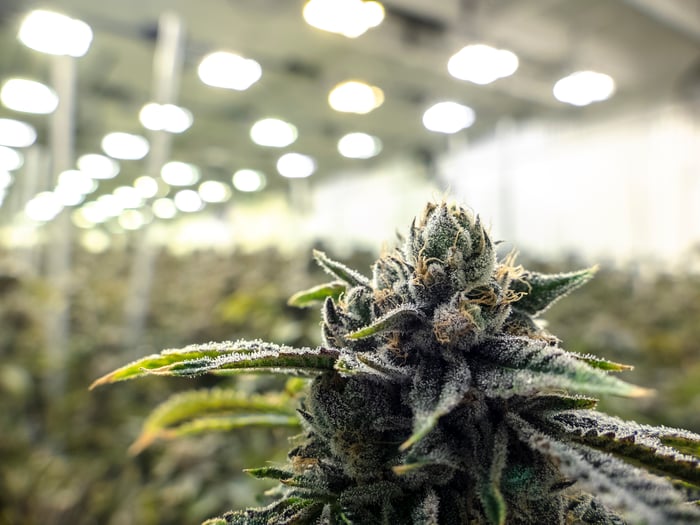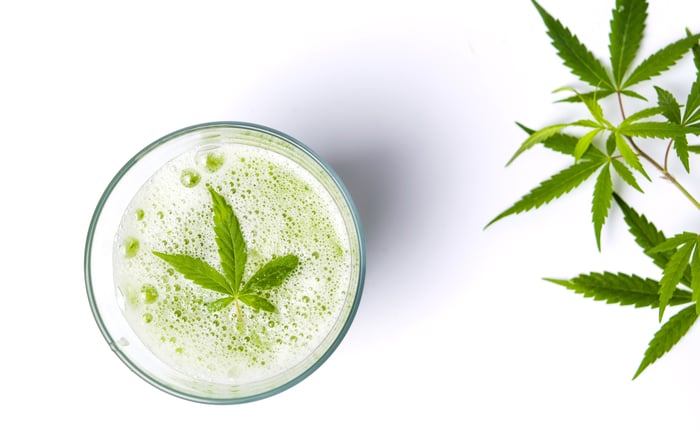Even though cannabis stocks have languished badly of late, sales in the global marijuana industry are thriving. After registering $10.9 billion in global sales in 2018, according to Arcview Market Research and BDS Analytics, worldwide licensed pot-store sales should top $40 billion by 2024. That's a compound annual growth rate of better than 24%.
This rapid growth is a big reason investors have flocked to marijuana stocks, and confirms why cannabis companies have been spending so aggressively to gobble up early stage market share. But this growth isn't lost on brand-name companies, a handful of which have formed deals with cannabis stocks, or decided to dip their toes into the pond, so to speak. Here are five household names that are now actively involved in the marijuana space.

Image source: Getty Images.
Scotts Miracle-Gro
If you're one of the tens of millions of Americans who owns a home, then you're probably familiar with Scotts Miracle-Gro (SMG -1.35%), which provides an assortment of soil, nutrient, and pest solutions to residential and commercial clients. Whether you want your lawn to look its best or you're trying to maximize crop yield as a commercial farmer, Scotts Miracle-Gro has long relied on its assortment of products to get the job done. Thus, it was only logical that it would branch off into cannabis.
Scotts Miracle-Gro subsidiary Hawthorne Gardening acts as its marijuana wing. Last year, Hawthorne was responsible for 13% of total sales as a supplier of hydroponic solutions (i.e., growing plants in a nutrient-rich water solvent, as opposed to soil), as well as lighting, soil, and nutrient needs.
However, the acquisition of Sunlight Supply last year for $450 million in a cash-and-stock deal should really put some pep in Hawthorne's step. With a wider assortment of hydroponic products, and a bigger focus on small- and medium-sized growers, it's not out of the question for Hawthorne to generate in excess of 20% of Scotts Miracle-Gro's total sales. With sales for Hawthorne expected to grow 75% to 80% in 2019, with 12% to 15% organic growth, Scotts has welcomed the cannabis movement with open arms.

Image source: Getty Images.
Constellation Brands
Although the name Constellation Brands (STZ -17.09%) isn't likely to ring a bell with many Americans, most folks are likely familiar with its products, which include the Corona and Modelo beer lines, as well as the Robert Mondavi line of wine products, and Svedka vodka, among other beer, wine, and spirit brands.
Constellation Brands got its foot in the door by making three separate equity investments into Canopy Growth (CGC -7.89%), the largest marijuana stock in the world by market cap. In October 2017, Constellation invested $190 million for what was a nearly 10% stake in Canopy. Then, in June 2018, it gobbled up a third of a 600 million Canadian dollar convertible note offering from Canopy Growth. But the creme de la creme came in August, when Constellation announced a $4 billion equity stake in Canopy, which closed in November. Today, Constellation has a 37% stake in the largest pot stock in the world, and it could boost its ownership to as high as 56% if it exercises warrants that it holds as part of its most recent equity investment.
Even though Constellation Brands remains focused on its core alcohol brands, it's no secret that cannabis is a real pathway to future growth. Constellation played a key role in showing Canopy Growth's visionary co-CEO, Bruce Linton, the door, and presumably expects the company's next CEO to be more cost-focused (Canopy reported a CA$670 million net loss in fiscal 2019).

Image source: Getty Images.
Altria
It's not just alcohol companies that are getting in on the action, either (although there are more to come on this list). Big tobacco has been known to dabble in the cannabis industry, with Altria (MO -1.20%) leading that charge.
Like Constellation Brands, a number of Americans probably aren't familiar with Altria the company. But they'd likely recognize its premium cigarette brand Marlboro, or its more ancillary brands, such as Parliament, Basic, or Virginia Slims, among others. Altria also owns a 35% stake in vaping device maker Juul.
Where Altria fits into the cannabis picture is through its $1.8 billion equity investment into Cronos Group (CRON -2.46%), which closed in March. Altria's investment gives the company a 45% nondiluted stake in Cronos, as well as protections that allow it to keep its ownership level steady in the event of ongoing share-based dilution. Furthermore, similar to Constellation above, warrants it received could allow Altria to up its stake in Cronos Group to 55%, if exercised.
With Altria having plenty of marketing expertise and a partnership with Juul, it should come as no surprise that Cronos aims to be a major vape player when derivatives begin hitting dispensary store shelves in Canada in mid-December. Among the various alternative consumption options, vaping is forecast to generate the highest annual sales.

Image source: Molson Coors.
Molson Coors Brewing
Another household brand involved in the marijuana industry is Molson Coors Brewing (TAP -5.67%). As its name suggests, Molson Coors owns the Molson and Coors lines of beer, as well as the Blue Moon, Keystone, and Miller brands.
Whereas most alcohol producers have been growing slowly but steadily, Molson Coors has been in a funk throughout North America. It's seen its Canadian beer market share shrink over the past decade and has been actively searching for ways to spark interest in its brands. Entering the nonalcoholic infused beverage space is one such way to boost its top line.
Last August, Molson Coors announced that it would form a joint venture with Quebec-based HEXO, which is now known as Truss. The joint venture -- Molson Coors holds a 57.5% stake -- expects to have a line of cannabis-infused beverages on dispensary shelves as soon as derivative products are allowed for sale in December. It's unclear exactly how much revenue this could generate for Molson Coors Brewing, but simply having a product in the fast-growing pot industry could help reignite interest in its core brands.

Image source: Anheuser-Busch InBev.
Anheuser-Busch InBev
Lastly, even Anheuser-Busch InBev (BUD -5.87%) is trying to stake its claim to the cannabis industry.
In December, Anheuser-Busch InBev, which owns the iconic Budweiser brand and Stella Artois, to name a few, formed a $100 million joint venture with Canadian grower Tilray that'll see each company provide $50 million in funding. The duo will research and develop a line of nonalcoholic cannabis-infused beverages for the Canadian market.
What's most interesting about Anheuser-Busch InBev's foray into marijuana is that its CEO, Carlos Brito, had no intention of entering the pot industry as recently as June 2018. In an interview with Just-Drinks.com, Brito had this to say:
Cannabis is something that we as a company are trying to learn more about. It's going to be regulated. It's going to be commercialized. But it's still a very restricted business and, in most places, it's not legal... We'll continue to follow it, but for now, we don't feel we need to do anything.
The fact that Brito changed his mind so quickly shows just how tempting the growth potential is from the cannabis industry, and why these five household brands won't be the last to invest or enter this space.





